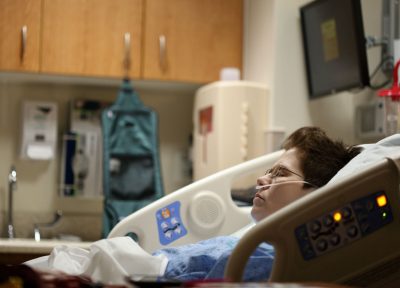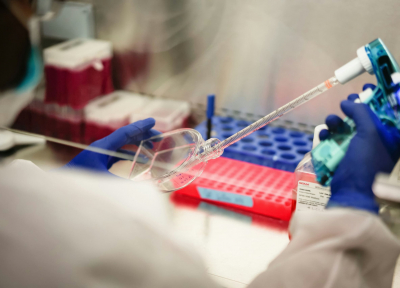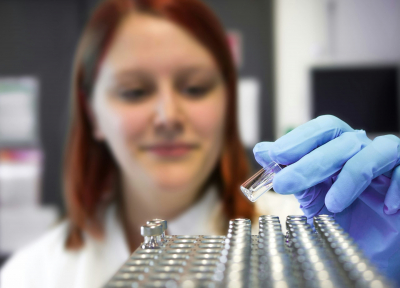Pancreatic cancer arises when the cells of the pancreas undergo genetic mutations, allowing them to grow uncontrollably. These cancerous cells arise from different cell types within the pancreas: exocrine and endocrine cells. Exocrine cells secrete fluid into the small intestine for digestion, while endocrine cells release hormones such as insulin into the blood stream. About 92% of pancreatic cancers come from exocrine cells.
Pancreatic cancer is often called the “silent cancer” because its symptoms are often overlooked, leading to misdiagnosis. Symptoms such as abdominal and back pain, jaundice, nausea, vomiting, and changes in bowel movements coincide with other conditions like gallbladder disease, heartburn, stomach ulcers, irritable bowel syndrome (IBS), and intestinal infections.
Pancreatic Cancer is Hard to Treat
For most people with pancreatic cancer, surgery is the first line treatment. But too often, it’s not enough. The pancreas is located behind vital organs such as the stomach and the small intestines. About 15 to 20% of tumors are removable with surgery if the cancer is caught early (what doctors call stage 1 or 2). As pancreatic cancer progresses to stage 3 or 4, the tumors can reach a large enough size to obstruct surrounding tissues making surgery difficult or not viable.
Chemotherapy is a crucial treatment for many cancers. However, chemotherapy may not be as effective for pancreatic cancer because the tumors are often very fibrotic (like scar tissue), which creates a physical barrier around the tumor. This barrier can create “sanctuary” regions where the chemotherapy cannot reach the cancerous cells.
Immune Checkpoint Inhibitors Bring Hope in Combination Therapy
Advances in immunology and cancer research have led to new treatment options that are bringing hope to patients with pancreatic cancer. For example, immune checkpoint inhibitors – drugs that aim to boost the immune response against cancer – have shown some success treating pancreatic cancer patients when used in combination with chemotherapy.
However, the issue of disease recurrence (when the cancer comes back after treatment) in patients is of great concern. About 80% of patients will develop disease recurrence within 5 years, and about 60% will develop recurrence within 2 years of treatment. This is due to left over cancer cells that are undetected by medical scans and tests.
New Research Aims to Prevent Cancer Coming Back
A new therapy on the horizon may bring new hope for pancreatic cancer patients. Unlike vaccines that prevent people getting diseases, cancer vaccines are being developed that are therapeutic meaning the vaccine can be used to treat cancer. Usually, these therapeutic vaccines contain mutated components of the patient’s tumor that help train the immune system to respond and attack cancer cells.
Recently, results from a phase 1 clinical trial set out to test a new pancreatic cancer vaccine that targets a specific mutation to a gene called KRAS. These genetic mutations are expressed in 90% of pancreatic cancers so the vaccine offers potential to treat many people with the disease. As this was a phase 1 trial – the first phase of testing whether a new treatment is safe and effective – the trial was small. The vaccine was given to 25 patients, 20 with pancreatic cancer and 5 with colorectal cancer.
Pancreatic Cancer Vaccine
In this trial, patients underwent surgery and chemotherapy. Blood tests taken after treatment showed that some of the cancer cells still remained, which put them at risk of recurrence. The patients then received six doses of the vaccine over the course of eight weeks and then three months later thirteen patients received booster immunizations over the course of four weeks. These vaccines trained their immune system to fight the cancer.
Twenty-one of the 25 patients had an immune response to the KRAS mutations and some patients were noted as being “super-responders” – people whose immune systems mounted an uncharacteristically strong response. Amazingly, in this trial, people with pancreatic cancer survived for an average of 29 months and lived recurrence-free for more than 15 months post-vaccination. This far exceeds what doctors expect to see when traditionally post surgery patients survive recurrence free about 8 months.
Training T cells in the Lymph Nodes
What is remarkable about this specific cancer vaccine is its ability to traffic directly to the lymph node. The lymph node is home to specific immune cells called T and B cells. T cells can destroy cancer cells by recognizing them as different from healthy tissue. The vaccine used in the AMPLIFY-002 trial can directly train T cells in the lymph node to recognize the cancer and mount an immune response. Amazingly, T cell responses induced by the vaccine correlated with long term-term survival and brings about exciting potential for utilizing this vaccine for KRAS mutated cancers. This potential vaccine highlights how immunology research can offer new hope for patients with hard-to-treat cancers like pancreatic cancer.



